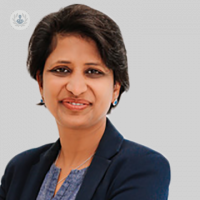Family history of breast cancer? Things you should know!
Escrito por:If there is a history of breast cancer in your family, it is important to have the appropriate assessment with your doctor in order to determine your own risk of getting the disease. If a first degree relative such as your mother, sister or daughter has been diagnosed with breast cancer, it makes your chances of developing it much higher.
However, it is not a certainty that you will develop breast cancer as most women who are diagnosed with it do not have a family history of the disease and it’s because the type of cancer is so common. Having an assessment will give both you and your doctor a better understanding of your individual case.
Miss P.G. Roy is a highly-trained breast and oncoplastic surgeon and here she explains everything that you need to know about living a family history of breast cancer and what you should do.

What is considered a family history of breast cancer?
It’s important to understand that only 5-10% of breast cancers are inherited. What constitutes a significant family history is guided by NICE guidelines. First and/or second-generation relatives with breast or ovarian cancer are relevant.
In general, the younger the age of the affected relatives (under 50), the less number of affected relatives make the history significant. If your doctor is concerned about your family history, he/she would offer you to be referred to local genetics service by filling out a family history questionnaire, who would then assess the risk from the Pro-forma and advise you accordingly.
Which type of breast cancer is hereditary?
The hereditary breast cancers are often triple-negative or oestrogen receptor-positive but the reverse is not always true, for example, not all triple-negative or ER-positive cancers are hereditary. The cancer clinicians will arrange for genetics input if there are concerns about cancer being potentially inherited, taking into account family history and the profile of cancer that the patient presents with.
How likely are you to develop breast cancer if a family member has had it before?
This would depend on the details of your family history. You are best guided by your clinical team who would often take the help of geneticist to assess the eligibility for gene mutation testing.
Does breast cancer often 'skip' a generation?
That's possible. It’s not uncommon for men to pass it on to the next generation. It’s therefore important that men in families with gene mutation are also tested so that they are aware of their individual risk and potential to pass the faulty gene to their children.
When should you screen for breast cancer if you have a family history of it?
This is determined by the type of faulty gene, which in turn dictates the relative risk. For example, if you have a p53 mutation, screening starts at a very young age and involves an MRI scan. For BRCA mutation, the screening often starts at 30 years, initially with MRI and then with a mammogram. For moderate risk, mammographic screening is advised from the age of 40.
What signs and symptoms should you look out for?
The signs and symptoms to look out for are the same, irrespective of whether you have increased risk through family or not. Most cases of breast cancer are found by women noticing unusual changes in their breasts, such as an inverted nipple, or lump, or a change in the size of the breast, and who take the initiative to visit their GP.
It is important to be breast aware and regularly checking your breasts should be as simple as the acronym TLC, which means to 'touch, look and check'. This is best described in the breast cancer leaflet here.
If you would like to discuss your family history of breast cancer with Miss Roy, you can make an appointment with her via her Top Doctor’s profile here.


